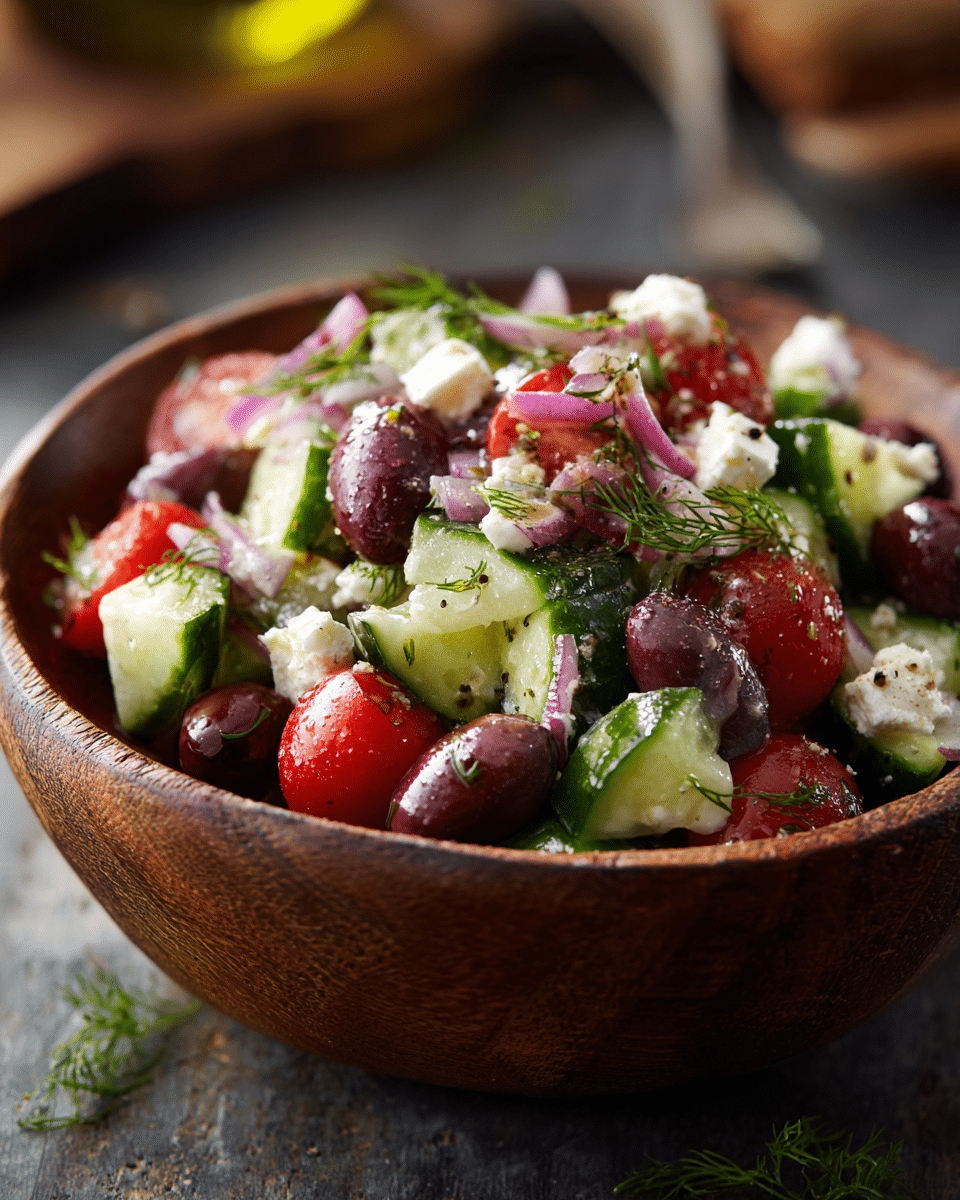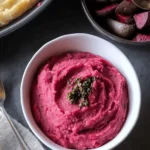A refreshing and vibrant dish, this Greek Cucumber Salad with Olives is a staple of Mediterranean cuisine. With crisp cucumbers, briny Kalamata olives, juicy tomatoes, and a tangy vinaigrette, this salad is not only bursting with flavor but also packed with nutrients. It makes a perfect side dish for grilled meats, a light lunch, or a delicious part of a mezze spread.
FULL RECIPE
Ingredients
- 2 large cucumbers, thinly sliced
- 1 cup cherry tomatoes, halved
- ½ cup red onion, thinly sliced
- ¾ cup Kalamata olives, pitted
- ½ cup crumbled feta cheese
- 2 tablespoons fresh dill, chopped
- 2 tablespoons extra virgin olive oil
- 1 tablespoon red wine vinegar
- 1 teaspoon dried oregano
- Salt and black pepper to taste
Directions
- In a large mixing bowl, combine the sliced cucumbers, cherry tomatoes, red onion, and Kalamata olives.
- Sprinkle the crumbled feta cheese and chopped dill over the top.
- In a small bowl, whisk together the olive oil, red wine vinegar, oregano, salt, and pepper to make the dressing.
- Pour the dressing over the salad and toss gently to combine, making sure all the ingredients are well coated.
- Chill in the refrigerator for about 15–20 minutes before serving to let the flavors meld.
- Serve as a refreshing side or enjoy on its own for a light, satisfying meal.
Nutrition Facts
- Calories: 180
- Total Fat: 15g
- Saturated Fat: 5g
- Cholesterol: 20mg
- Sodium: 520mg
- Total Carbohydrates: 7g
- Dietary Fiber: 2g
- Sugars: 3g
- Protein: 4g
- Vitamin A: 10% DV
- Vitamin C: 20% DV
- Calcium: 15% DV
- Iron: 6% DV
Mediterranean Heritage of Greek Cucumber Salad
Greek Cucumber Salad is rooted in the culinary traditions of the Mediterranean, particularly Greece, where fresh, seasonal produce forms the cornerstone of every meal. The salad reflects the simplicity and wholesomeness of the Mediterranean diet, using humble ingredients like cucumbers, tomatoes, onions, olives, and herbs to deliver bold, refreshing flavors. The popularity of this salad globally highlights its cultural significance and adaptability across cuisines, often appearing as a staple in Mediterranean restaurants and home kitchens alike. Its historical relevance makes it more than just a dish—it’s a celebration of ancient dietary wisdom still embraced today.
The Role of Cucumbers in Hydration and Digestion
Cucumbers are over 95% water, making them an excellent hydrating food, especially during hot months. They also contain fiber, particularly in the skin, which supports digestive health. In this salad, cucumbers add a crisp, cooling contrast to the richer, saltier components like olives and feta. Their high water content helps balance the bold flavors while delivering a light, rejuvenating effect. Including cucumbers regularly in your meals can help keep you hydrated and support smoother digestion, especially when paired with other fresh vegetables and healthy fats as seen in this salad.
Kalamata Olives and Their Nutritional Profile
Kalamata olives are known for their deep purple color and distinctive briny taste. Rich in heart-healthy monounsaturated fats, they are also a good source of antioxidants like polyphenols and vitamin E. These olives contribute significantly to the salad’s flavor and nutrient density, supporting cardiovascular health and anti-inflammatory processes. While they are higher in sodium due to the brining process, in moderation, they enhance both taste and health benefits. Their bold, umami-rich profile complements the lighter cucumbers perfectly, adding Mediterranean authenticity and nutritional value to the salad.
Feta Cheese: A Creamy, Tangy Protein Boost
Feta cheese, made traditionally from sheep’s milk or a combination of sheep and goat’s milk, brings a creamy texture and tangy taste to the salad. It is relatively lower in fat than many other cheeses and is a good source of calcium, protein, and B vitamins. Its crumbly texture disperses evenly throughout the salad, ensuring every bite has a burst of flavor. Feta enhances satiety and protein content without overwhelming the dish with heaviness. Its nutritional and culinary contributions make it an integral part of the classic Greek salad combination.
Red Onion for a Bite and Blood Sugar Support
Red onions add a pungent, sharp bite that contrasts nicely with the freshness of cucumbers and the creaminess of feta. They also offer a variety of health benefits thanks to their antioxidant compounds, particularly quercetin, which supports blood sugar regulation and heart health. The slight spiciness and crunch of raw red onions liven up the flavor profile, making the dish more dynamic. In addition to taste, their nutritional attributes provide added incentive for including them in salads like this one.
Fresh Dill and Oregano: Fragrant and Functional Herbs
Herbs like dill and oregano aren’t just flavorful—they’re also medicinal in many cultures. Dill offers a grassy, slightly sweet taste and contains flavonoids that support digestion and reduce inflammation. Oregano is packed with antioxidants and has antimicrobial properties. Together, they elevate the salad’s freshness while contributing to its health-promoting potential. Using fresh herbs is a small but impactful way to enhance both the flavor and nutritional profile of everyday meals, and this salad benefits greatly from their presence.
Olive Oil and Red Wine Vinegar: Simple but Powerful Dressing
The dressing for Greek Cucumber Salad is traditionally simple—just olive oil and red wine vinegar. Olive oil, a staple of the Mediterranean diet, is rich in monounsaturated fats and anti-inflammatory compounds. Red wine vinegar adds acidity, which helps balance the richness of the cheese and olives while aiding in digestion and blood sugar control. This minimalist vinaigrette proves that you don’t need a long list of ingredients to create a balanced and healthful salad dressing. Its role is not only functional but also central to the Mediterranean flavor experience.
Low-Carb and Keto-Friendly Option
Greek Cucumber Salad is naturally low in carbohydrates, making it an excellent choice for those following low-carb or keto lifestyles. The absence of starchy vegetables or sweet dressings allows it to fit easily into strict nutritional plans. With healthy fats from olives and olive oil and minimal sugar from vegetables, this salad provides sustained energy without blood sugar spikes. It’s a perfect way to enjoy fresh vegetables without compromising dietary goals, especially when seeking variety in low-carb meal planning.
Weight Management and Satiety Support
Despite being light and refreshing, Greek Cucumber Salad is quite filling thanks to the fiber from vegetables and the fat and protein content from olives and cheese. The combination of textures and flavors increases satiety, helping you feel full for longer. This makes the salad a strategic addition to weight management plans, especially when used as a starter to curb appetite or as a main dish during light meals. It’s proof that healthy eating doesn’t have to mean bland or unsatisfying.
Versatility in Meals and Meal Prep
This salad is highly versatile—it can be served on its own, as a side dish, or even as a topping for grilled meats or flatbreads. It works well for picnics, barbecues, potlucks, and weekday lunches. Because it uses hardy vegetables like cucumbers and onions, it holds up well in the fridge, making it ideal for meal prepping. You can easily scale up the recipe or adapt it with add-ins like chickpeas or quinoa for a heartier version. Its flexibility makes it a staple recipe for both casual and structured meal plans.
Advertisement
Ideal for Vegetarian and Gluten-Free Diets
Greek Cucumber Salad naturally fits into vegetarian and gluten-free diets, requiring no substitutions. This makes it an inclusive dish for gatherings where dietary needs vary. For vegans, the feta cheese can be replaced with a dairy-free alternative while maintaining the salad’s core flavor. Its plant-forward ingredients align with a wide range of dietary preferences and health goals, ensuring it remains a crowd-pleaser at almost any table.
Conclusion
Greek Cucumber Salad with Olives embodies the spirit of the Mediterranean diet—simple, fresh, flavorful, and nutritious. It blends textures, colors, and tastes in a way that satisfies both the palate and the body. From its hydrating and anti-inflammatory components to its potential for weight management and meal prep, this salad is far more than a side dish. It’s a nutrient-packed option suitable for a wide range of dietary needs, and its enduring popularity speaks to its timeless appeal in healthy home cooking.






